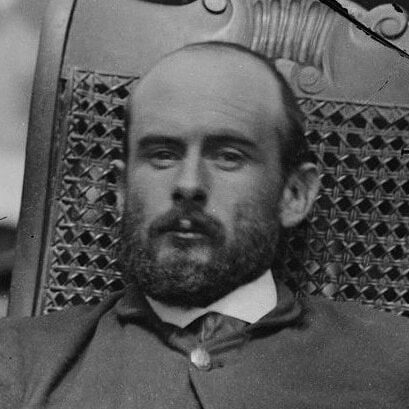Presidential Address
In Memoriam
From the American Historical Review 20:3 (April 1915)
General Charles Francis Adams (May 27, 1835–March 20, 1915), president of the American Historical Association in 1901, died at Washington on March 20; he was nearly eighty years old, but had maintained in old age exceptional health and vigor. Born in 1835, the second son of Charles Francis Adams, he served throughout the Civil War as a cavalry officer, and before its close attained the brevet rank of brigadier-general of volunteers. His distinguished military services left a deep impress upon his mind; he was always afterward an eager student of military history, especially of the history of the Civil War, and a keen and vigorous writer upon themes in that field. After the war he became identified with railway interests; for ten years he was a member, for seven years chairman, of the railway commission of Massachusetts, for thirteen years a government director, for six years, 1884–1890, president, of the Union Pacific Railroad. Chapters of Erie, published in 1871, established his reputation as a thoughtful and incisive writer on public affairs. Never holding a public office adequate to his remarkable powers, he took a strong interest in the affairs of his town, his state, and the nation, and wrote much on subjects in these fields. Widely informed, clear-headed, disinterested, attached to no party, inheriting from at least three preceding generations an absolutely independent and fearless American mind, he made contributions of signal importance to many public discussions, and showed a high example of rational patriotism. As an overseer of Harvard University during twenty-four years, he exerted a notable influence on American higher education there and elsewhere. The last twenty-five years of his life were largely devoted, in spite of many public services and public addresses, to American history, his first publications in that field being two Prince Society volumes (Morton’s New English Canaan and Antinomianism), an excellent life of R.H. Dana (1890), and Three Episodes of Massachusetts History (1892). In 1895 he was elected president of the Massachusetts Historical Society, which thereafter constantly received for twenty years the benefits of his care, his generosity, his energizing power, and his modernness of view. Most of what he wrote in these twenty years was contributed to the society’s Proceedings—vigorous and entertaining papers like those collected in Lee at Appomattox and other Papers (1902) and Studies Military and Diplomatic (1911), relating sometimes to the military history of the Revolution, sometimes to the Secession controversy, which he treated with characteristic magnanimity, but of late more often to the diplomatic history of the United States in the period from 1861 to 1872, the period of his father’s diplomatic career. In 1900 he published a brief biography of his father which is one of the best volumes in the American Statesmen series, and during all his remaining years he was occupied, with abundant materials but with many interruptions, in the preparation of a larger biography. All students of the period will lament that only part of it is completed, for Mr. Adams had an unrivalled knowledge of the field, and gifts of clear and vivid historical exposition that should have had an ampler field of exercise than was afforded by any of his published books. To this journal he was, throughout its history, a valued contributor. His interest in the American Historical Association continued active after the year of his presidency, and he was often the host of the Executive Council at the time of its annual meeting. As host at dinners he was seen at his best—hospitable, genial, and immensely entertaining by reason of his great store of experience and remembrance, and the humor and pungency of his speech. Sometimes gruff in manner, he was at heart notably kind, especially to younger men; and he was a fine model of independent, manly, and vigorous, but cultivated and generous character.
Bibliography
The genesis of the Massachusetts town, and the development of town-meeting government. By Charles Francis Adams, Abner C. Goodell, jr., Mellen Chamberlain, and Edward Channing. Cambridge, Mass.: J. Wilson and Son, 1892.
Chapters of Erie: and other essays. By Charles F. Adams, Jr., and Henry Adams. Boston: J.R. Osgood and Company, 1871; Reprint with an introduction by James C. Mohr. Prospect Heights, Ill. : Waveland Press, c2002.
Charles Francis Adams, 1835–1915; an autobiography. With a memorial address delivered November 17, 1915; Reprint, with in introduction by Henry Cabot Lodge. Westport, Conn., Greenwood Press, 1973.
Columbus and the Spanish discovery of America. By Charles Francis Adams, George E. Ellis, Gamaliel Bradford, Alexander McKenzie, and Justin Winsor. Cambridge: J. Wilson & Son, 1892.
The confederacy and the Transvaal: a people’s obligation to Robert E. Lee. By Charles Francis Adams. Boston: The Riverside Press, Houghton, Mifflin, 1901.
“Imperialism and the tracks of our forefathers”; a paper read by Charles Francis Adams before the Lexington, Massachusetts, Historical Society, Tuesday, December 20, 1898. Boston, D. Estes & Company, 1899.
Lee at Appomattox, and other papers, by Charles Francis Adams. 2d ed., enl. Boston, New York, Houghton, Mifflin and Company, 1903; Reprint, Freeport, N.Y., Books for Libraries Press, 1970.
Massachusetts, its historians and its history: an object lesson. By Charles Francis Adams. Tustin, Calif.: American Reprint Service, 1985.
The Monroe doctrine and Mommsen’s law. By Charles Francis Adams. Boston and New York, Houghton Mifflin company, 1914.
Railroads, their origin and problems. By Charles Francis Adams, Jr. New York: Arno Press, 1981.
Sir Christopher Gardiner, knight: an historical monograph: with additions. By Charles Francis Adams, jr. Cambridge: J. Wilson, 1883.
Studies military and diplomatic, 1775-1865. By Charles Francis Adams. New York, The Macmillan company, 1911; Reprint Freeport, N.Y., Books for Libraries Press, 1971.
